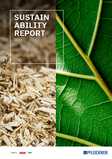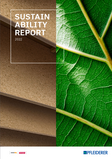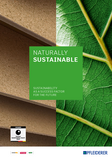Our approach
In 1894, Gustav Pfleiderer founded a timber trading company and a rafting business in Heilbronn which used wood-based products. At this time, he laid the foundations of our company and to this day, sustainable wood-based products remain at the core of all our operations.
At Pfleiderer, corporate strategy and sustainability strategy are directly interlinked. Back then implicitely, today very deliberately. We produce our wood-based materials with a steadily increasing proportion of recycled wood and use biomass as the main source of energy our production. This is one of the reasons why sustainability – in its ecological, social and economic dimensions – is inextricably linked to Pfleiderer’s business model. Growth cannot be an end in itself. We are convinced that we can only achieve long-term entrepreneurial success with satisfied customers, healthy and motivated employees, and ambitious goals for environmental and climate protection. This results in a far-reaching responsibility, which we take very seriously.
In line with our commitment to being “naturally sustainable”, we can look back on many years of successful transformation. Our efforts are underpinned by concrete successes in securing our timber supply chain, increasing the proportion of renewable energy, increasing our recycling rate and reducing our greenhouse gas emissions. Especially important for us are our successes in increasing occupational health and safety in the company, fighting corruption and protecting human rights.
Our place in the circular economy
The Pfleiderer Group was one of the pioneers in waste wood recycling and, in terms of the amount of waste wood purchased and processed, was the largest waste wood purchaser in Germany and one of the largest in Europe in 2022.
We also have the most extensive laboratory facilities which enables us to regularly set standards in research and development with respect to the sorting and testing of raw materials and final products.
For over 125 years, the renewable material wood has been inextricably linked with Pfleiderer as a company and its employees, customers, and business partners. Sustainable business practices have shaped our corporate culture for decades. This has heightened our awareness, not only to the versatility of this natural raw material, but especially to its value and irreplaceability in nature for countless ecosystems and climate stability.
Accordingly, we try to keep wood in the cycle as long as possible and to minimise the consumption of fresh wood. With our strong focus on the circular economy, we recycle this material wherever possible and use it to produce high-quality wood-based materials, thereby extending the CO2 storage capacity of wood. We use waste wood, which has reached the end of its useful material life due to contamination, to generate energy at our locations – thus closing the circle of wood use.
We expect to reach our voluntary target to increase the ratio of post-consumer recycled wood in the total wood usage to 50 % in 2025 ahead of schedule. Today, the share lies at 48%, followed by sawmill residues with 32 %. The remaining 20% comprises wood from thinnings and calamities, which we procure since 2007 exclusively from controlled forest management in Germany and directly neighbouring countries.
Through internal and external audits we have annual verifcation that the underlying criteria of FSC® Controlled Wood and PEFC Controlled Sources are met throughout the entire chain of custody.
The use of renewable raw materials, cascading use and the circular economy are the only economic models that can ensure the sustainable production of high-quality building and furniture products in the long term. In addition, the wood-based panel industry is committed to making a significant contribution to the fight against climate change by reducing CO2 emissions through storage and substitution.

„Sustainability has been part of the DNA within the Pfleiderer business model for decades. We see this as an obligation and motivation to keep improving on behalf of our stakeholders in the focus areas of climate, materials and people.“
Dr. Frank Herrmann
CEO / Chairman of the Management Board
Our process
We comprehensively examined the effects of our business activities on the environment, economy and society as part of a materiality analysis. We reviewed three exciting fields of action – materials, climate and people. Classifying these fields allowed us to restructure and further intensify our sustainability efforts. On the basis of the previous analysis in 2020, we expanded our set of targets to include several key aspects:
One prime example of this is the working conditions within the company, where we have placed a particular focus on equal opportunities for under-represented employee groups. Our aim is to increase transparency in our supply chains and to achieve this we are developing framework conditions and criteria catalogues in 2023. In particular, we intend to analyse the impact of our business activities in the areas of greenhouse gas emissions, biodiversity and human rights. First of all, the goal is to clearly define the status quo so that we can set milestones and measure progress in detail over the next three to five years.
Our priorities
As a “naturally sustainable” company, we are clearly committed to the Paris climate agreement goals and aim to achieve net-zero CO2 emissions by 2050. We are also committed to the goals of the UN Global Compact and promote the Ten Principles in the areas of human rights, labour standards, environmental protection and zero tolerance for corruption.
Delivering Change
We operate at scale. The EU wood panel industry has a turnover of around €22 billion every year, creates over 100,000 jobs directly and counts more than 5,000 enterprises in Europe. Physical impacts from severe climatic patterns as well as high-level political coverage of climate change, which is increasing in its intensity from 2021, place sustainability thinking at the heart of every business model. As a result, our commitment to be more sustainable remains resolutely in place.
We work for our vision – this principle guides us in our daily actions so that we can become even more sustainable. We are constantly challenging ourselves in all aspects of sustainability and see it as our duty to improve in all areas.
In 2022 we expanded our set of targets and increased the transparency of our sustainability reporting in reference to GRI (Global Reporting Index) considerably. Consequently, our stakeholders now can find the required sustainability information more easily on pfleiderer.com. We have a lot of hard work ahead, but we are excited, too, by the notion that we can do better across every part of our business.

We are proud to be a naturally sustainable business
Our ESG targets
English Downloads
Downloads
125 YEARS PRACTISING SUSTAINABILITY
In 1894, company founder Gustav Adolf Pfleiderer chose wood as a sustainable material. Since then sustainable thinking and acting forms Pfleiderer's corporate culture.
Read more about sustainability at Pfleiderer
These topics may also be of interest to you:











